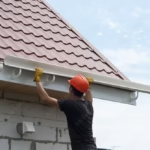When tackling the difficult subject of roof damage claims, many homeowners are perplexed. How long do I have to file a claim for roof damage? This is a crucial question that needs quick answers, as timing can make the difference between a straightforward process and a complicated one.
The timeline for filing a roof damage claim is something that varies greatly depending on several factors including the type of insurance policy, the insurance company, and the cause of the damage. Therefore, it’s important not just to understand these timelines, but also to know what steps to take when your roof is damaged.

Key Factors Impacting Roof Damage Claims
Type of Insurance Policy
Your insurance policy type significantly affects your claim window. Policies can differ in terms of coverage specifics and claim report deadlines. Always check the specific details stipulated in your policy documents or contact your insurance agent for precise information.
Insurance Company Policies
Company policies dictate specific deadlines for when a claim must be reported. Some companies might provide a more extended window, while others could require a more immediate filing. Knowing your specific insurer’s policies is vital.
Nature of Roof Damage
Whether the damage is due to natural disasters, wear and tear, or accidental incidents, the nature of the roof damage plays a role in determining the timeline for filing a claim.
Filing a Claim: Step by Step
Immediate Damage Assessment
Upon noticing damage, it is crucial to evaluate it immediately. Document everything with photos and notes for a comprehensive record to support your claim.
Contacting Your Insurance Provider
Immediately after a disaster or noticing damage, notify your insurance provider. They will guide you through the next steps and inform you of the necessary procedures to follow.
Understanding Documentation Requirements
Keep records of all assessments, repair estimates, and correspondence with contractors. This documentation is vital to successfully process your roof damage claim.
Common Reasons for Claim Denials
Understanding why claims are sometimes denied can save you the hassle of a lengthy appeal process.
Policy Exclusions
Every policy has specific exclusions that might render certain damage not covered. For example, routine wear and tear are generally not covered under most policies.
Missed Claim Deadlines
One of the most common reasons for denied claims is missed submission deadlines. It is essential to act quickly and stay within the specified timeframe.
For more insights, check this roof company’s guide.
Improving Your Chances of a Successful Claim
Regular Roof Maintenance
Routine inspections and maintenance can help prevent severe damage and simplify the claims process. Homeowners should conduct regular self-assessments or hire professionals for more thorough inspections.
Understanding Your Coverage
Knowing what your insurance policy covers is crucial to manage your expectations. Clarify any terms you do not understand with your insurance provider.
For a cost consideration, ensure you’re aligned with your coverage details.
Prompt Communication
Maintain an open line of communication with your insurer. Promptly answering any queries they have can significantly expedite the claims process.
Long-Term Considerations
Investment in Durable Roofing
Investing in high-quality roofing materials can prevent frequent damage and claims. Consult this EPDM roofing guide for more.
Climate Awareness
Acknowledging climate factors that affect your region helps in selecting the best roofing solutions and anticipating potential damages.

FAQs
What if I miss my claim deadline?
If you miss the deadline, your request might be denied, but in some cases, providers offer extensions for valid reasons. Contact your provider immediately for guidance.
How quickly should I file my roof damage claim?
File your claim as quickly as possible after damage occurs to ensure adherence to any designated deadlines.
Can I file a claim if the damage was from a slow leak?
Slow leak damages can be tricky and may fall under maintenance issues instead of sudden damage, potentially affecting claim eligibility.
For more information and roofing advice, visit this roofing guide.
This article contains affiliate links. We may earn a commission at no extra cost to you.







